Econometric Tools for Macroeconomic Forecasting and Simulation
This research group advances the development and application of quantitative macroeconometric models to improve the accuracy, transparency, and policy relevance of macroeconomic forecasts and simulations. Its work supports the empirical and methodological foundation of the IWH’s forecasting activities and policy recommendations.
The group focuses on both short-term forecasting and simulation-based assessments of long-term economic developments, with particular attention to the interactions between economic activity and the environment. Key areas of expertise include reduced-form models for short-term forecasting, regional disaggregation of macroeconomic trends, structural forecasting techniques, and Dynamic Stochastic General Equilibrium (DSGE) models for scenario analysis.
In addition to its core research, the group develops customized forecasting tools and conducts applied analyses in third-party funded projects. Recent collaborations include model development for Volkswagen Bank, economic ministries in Central Asia (supported by GIZ), the German Environment Agency (UBA), and the EU Horizon 2020 project ENTRANCES, which addresses clean energy transitions in European regions.
By integrating rigorous econometric methods with practical applications, the group contributes to a better understanding of macroeconomic dynamics and enhances the basis for evidence-based policy decisions at national and international levels.
Research Cluster
Economic Dynamics and StabilityYour contact

- Department Macroeconomics
EXTERNAL FUNDING
07.2022 ‐ 12.2026
Evaluation of the InvKG and the federal STARK programme
German Federal Ministry for Economic Affairs and Climate Action
On behalf of the Federal Ministry of Economics and Climate Protection, the IWH and the RWI are evaluating the use of the approximately 40 billion euros the federal government is providing to support the coal phase-out regions..
12.2024 ‐ 02.2026
Macroeconomic Modelling for Energy Investments in Vietnam
Deutsche Gesellschaft für Internationale Zusammenarbeit (GIZ) GmbH
08.2024 ‐ 03.2025
Strengthening Public Financial Management in Vietnam
Deutsche Gesellschaft für Internationale Zusammenarbeit (GIZ) GmbH
01.2023 ‐ 12.2023
Early determination of stable results for gross domestic product or real economic growth and gross value added at federal state level
Landesbetrieb Information und Technik Nordrhein-Westfalen
The project examines whether the accuracy of the first estimate of gross value added and gross domestic product for the federal states can be increased, thereby reducing the extent of subsequent revisions.
01.2018 ‐ 12.2023
EuropeAid (EU Framework Contract)
Europäische Kommission
05.2020 ‐ 09.2023
ENTRANCES: Energy Transitions from Coal and Carbon: Effects on Societies
Europäische Kommission
ENTRANCES aims at examining the effects of the coal phase-out in Europe. How does the phase-out transform society – and what can politics do about it?
This project has received funding from the European Union’s Horizon 2020 research and innovation programme under grant agreement No 883947.
10.2019 ‐ 01.2023
Climate Resilient Economic Development
Climate change has a substantial impact on economic growth and a country’s development. This increases the need for reliable and viable approaches to assessing the impact of climate risks and potential adaptation scenarios. Political decision-makers in ministries of planning and economy need sound forecasts in order to design and finance adequate economic policy instruments and actively to take countermeasures. In the pilot countries (Georgia, Kazakhstan and Vietnam), climate risk is included in macroeconomic modelling, enabling the results to be integrated into the policy process so as to facilitate adapted economic planning. The IWH team is responsible for macroeconomic modelling in Vietnam.
07.2016 ‐ 12.2018
Climate Protection and Coal Phaseout: Political Strategies and Measures up to 2030 and beyond
01.2017 ‐ 12.2017
Support to Sustainable Economic Development in Selected Regions of Uzbekistan
01.2017 ‐ 12.2017
Short-term Macroeconomic Forecasting Model in Ministry of Economic Development and Trade of Ukraine
01.2016 ‐ 12.2017
Development of analytical tools based on Input-Output table
The aim of the project was the development of an analytical tool to assess the gains and losses of possible state programs supporting the development of the private sector of the Tajik economy.
11.2015 ‐ 12.2016
Employment and Development in the Republic of Uzbekistan
Support to sustainable economic development in selected regions of Uzbekistan
05.2016 ‐ 05.2016
Framework and Finance for Private Sector Development in Tajikistan
02.2016 ‐ 04.2016
Macroeconomic Reforms and Green Growth - Assessment of economic modelling capacity in Vietnam
10.2015 ‐ 03.2016
Improved Evidence-based Policy Making - GIZ Tadschikistan
Deutsche Gesellschaft für Internationale Zusammenarbeit (GIZ) GmbH
Refereed Publications
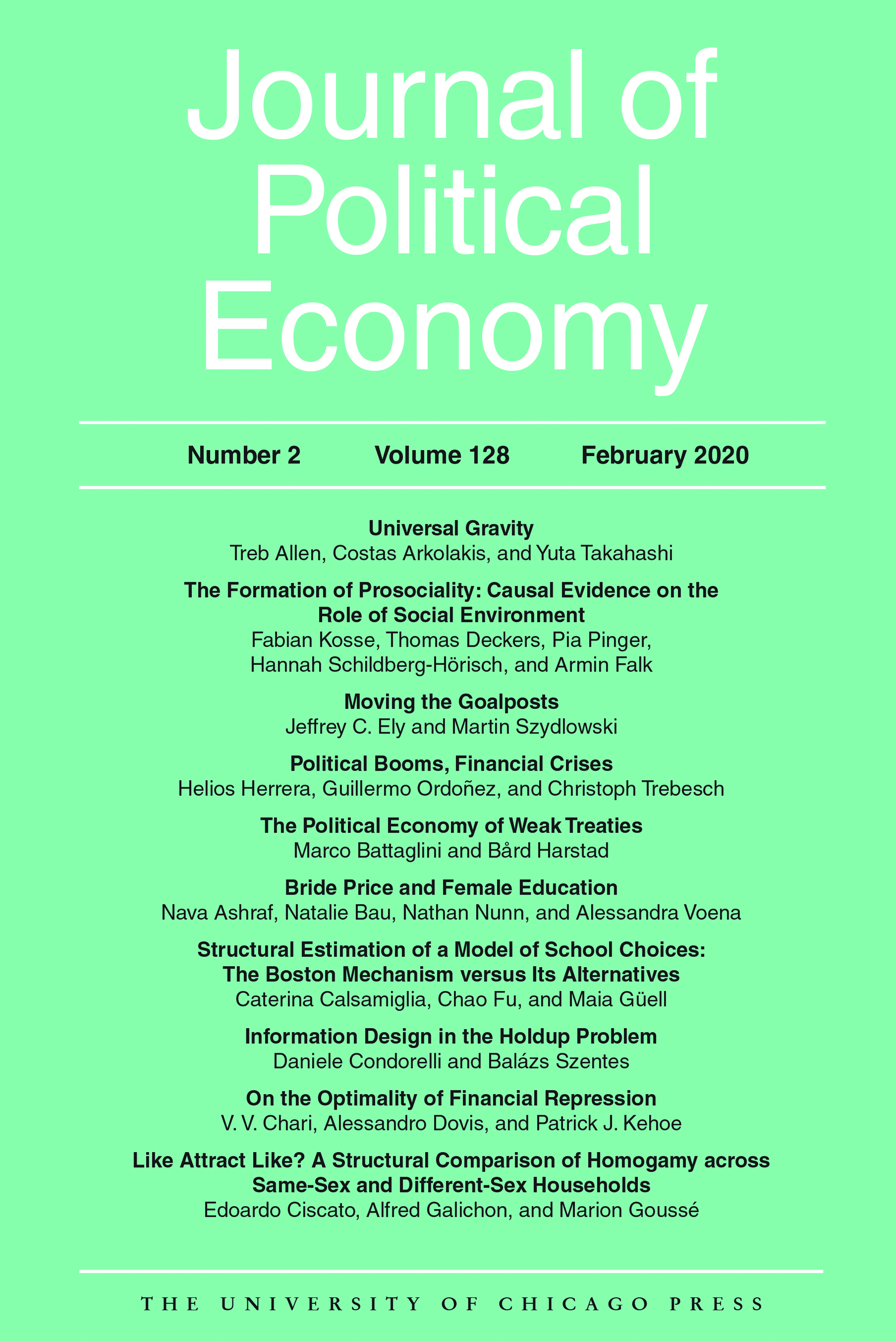
Expectations, Infections, and Economic Activity
in: Journal of Political Economy, No. 8, 2024
Abstract
The Covid epidemic had a large impact on economic activity. In contrast, the dramatic decline in mortality from infectious diseases over the past 120 years had a small economic impact. We argue that people's response to successive Covid waves helps reconcile these two findings. Our analysis uses a unique administrative data set with anonymized monthly expenditures at the individual level that covers the first three Covid waves. Consumer expenditures fell by about the same amount in the first and third waves, even though the risk of getting infected was larger in the third wave. We find that people had pessimistic prior beliefs about the case-fatality rates that converged over time to the true case-fatality rates. Using a model where Covid is endemic, we show that the impact of Covid is small when people know the true case-fatality rate but large when people have empirically-plausible pessimistic prior beliefs about the case-fatality rate. These results reconcile the large economic impact of Covid with the small effect of the secular decline in mortality from infectious diseases estimated in the literature.
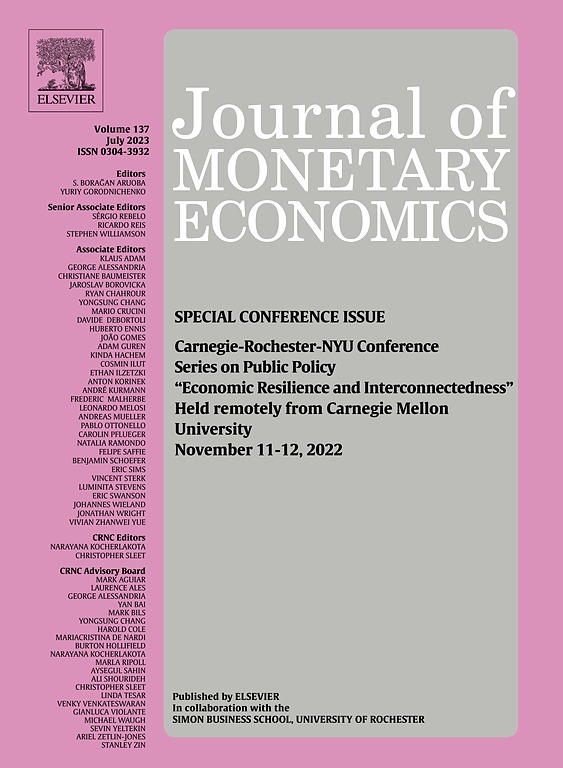
Understanding Post-Covid Inflation Dynamics
in: Journal of Monetary Economics, November 2023
Abstract
We propose a macroeconomic model with a nonlinear Phillips curve that has a flat slope when inflationary pressures are subdued and steepens when inflationary pressures are elevated. The nonlinear Phillips curve in our model arises due to a quasi-kinked demand schedule for goods produced by firms. Our model can jointly account for the modest decline in inflation during the Great Recession and the surge in inflation during the post-COVID period. Because our model implies a stronger transmission of shocks when inflation is high, it generates conditional heteroskedasticity in inflation and inflation risk. Hence, our model can generate more sizeable inflation surges due to cost-push and demand shocks than a standard linearized model. Finally, our model implies that the central bank faces a more severe trade-off between inflation and output stabilization when inflation is elevated.
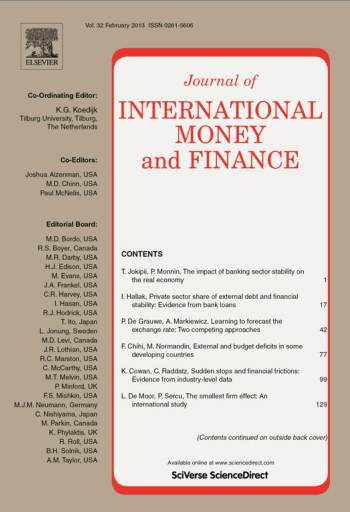
Conditional Macroeconomic Survey Forecasts: Revisions and Errors
in: Journal of International Money and Finance, November 2023
Abstract
Using data from the European Central Bank's Survey of Professional Forecasters and ECB/Eurosystem staff projections, we analyze the role of ex-ante conditioning variables for macroeconomic forecasts. In particular, we test to which extent the updating and ex-post performance of predictions for inflation, real GDP growth and unemployment are related to beliefs about future oil prices, exchange rates, interest rates and wage growth. While oil price and exchange rate predictions are updated more frequently than macroeconomic forecasts, the opposite is true for interest rate and wage growth expectations. Beliefs about future inflation are closely associated with oil price expectations, whereas expected interest rates are related to predictions of output growth and unemployment. Exchange rate predictions also matter for macroeconomic forecasts, albeit less so than the other variables. With regard to forecast errors, wage growth and GDP growth closely comove, but only during the period when interest rates are at the effective zero lower bound.
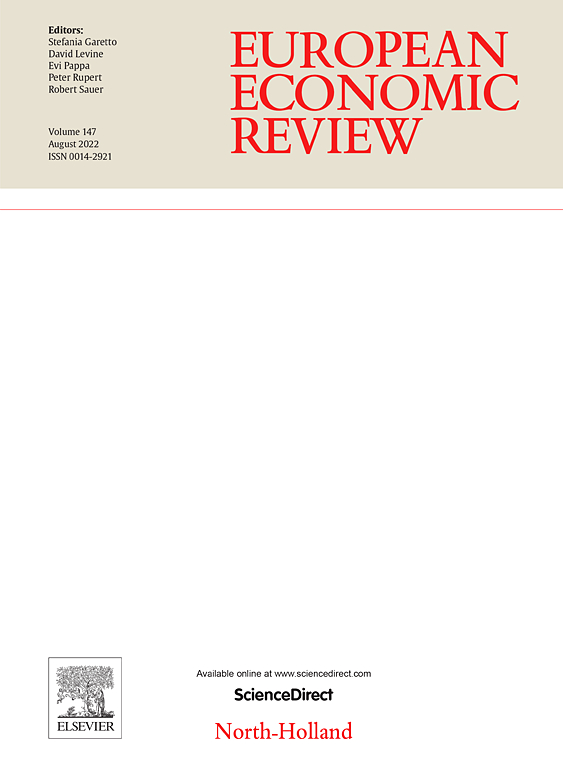
Comment on “Optimal monetary policy in an estimated SIR model by G. Benmir, I. Jaccard, and G. Vermandel”
in: European Economic Review, September 2023
Abstract
<p>Benmir, Jaccard, and Vermandel (2023, BJV) seek to answer the following set of topical and important research questions: (i) How should monetary policy be conducted during a pandemic?, (ii) How do health considerations affect the conduct of monetary policy?, and (iii) How does the presence of contagion risk affect the main building blocks of the New Keynesian model?</p>

Evidence-based Support for Adaptation Policies in Emerging Economies
in: Low Carbon Economy, No. 1, 2023
Abstract
Climate change is increasingly evident, and the design of effective climate adaptation policies is important for regional and sectoral economic growth. We propose different modelling approaches to quantify the socio-economic impacts of climate change on three vulnerable countries (Kazakhstan, Georgia, and Vietnam) and design specific adaptations. We use a Dynamic General Equilibrium (DGE) model for Vietnam and an economy-energy-emission (E3) model for the other two countries. Our simulations until 2050 show that selected adaptation measures, in particular in the agricultural sector, have positive implications for GDP. However, some adaptation measures can even increase greenhouse gas emissions. Focusing on GDP alone can lead to welfare-reducing policy decisions.
Working Papers
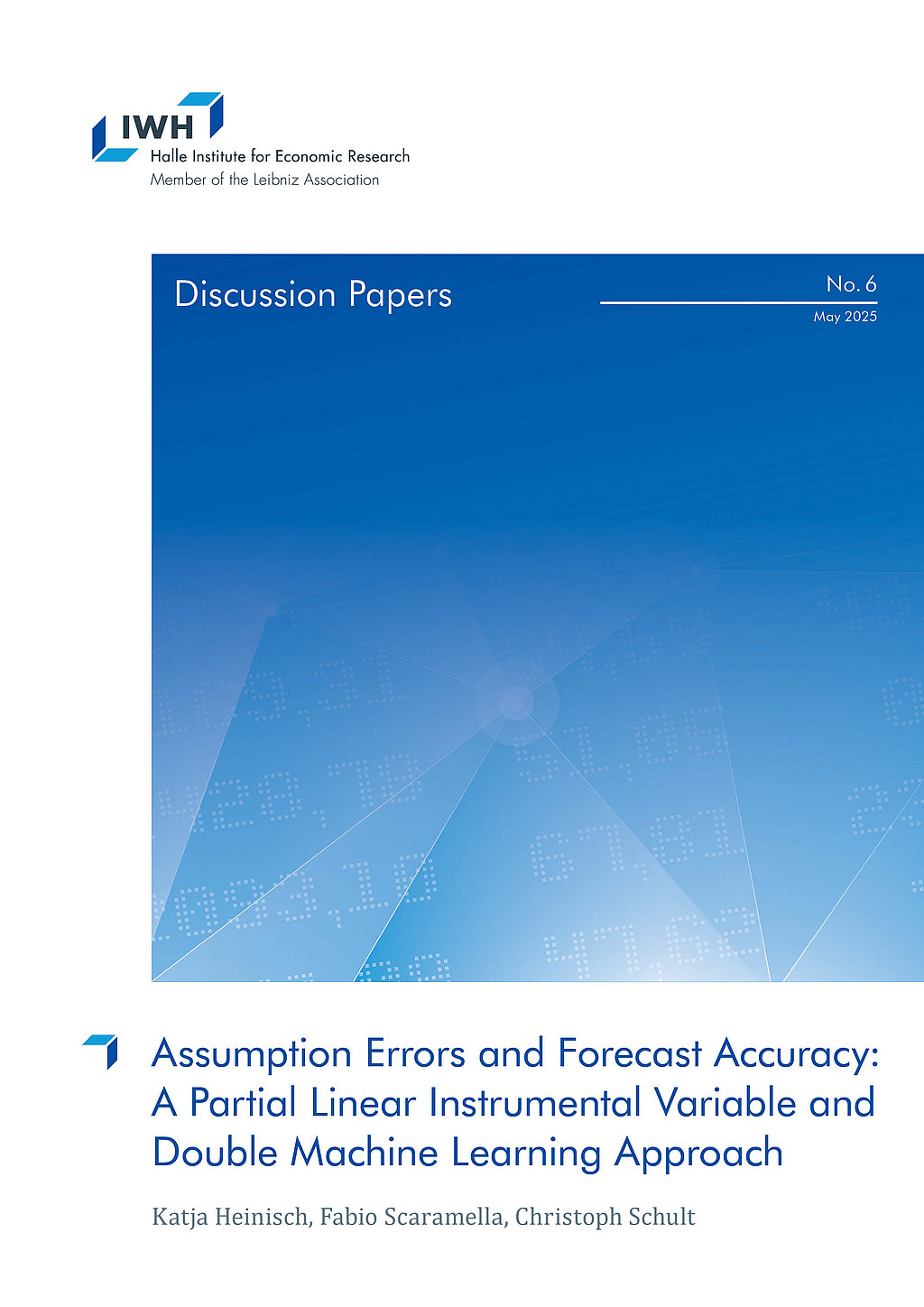
Assumption Errors and Forecast Accuracy: A Partial Linear Instrumental Variable and Double Machine Learning Approach
in: IWH Discussion Papers, No. 6, 2025
Abstract
<p>Accurate macroeconomic forecasts are essential for effective policy decisions, yet their precision depends on the accuracy of the underlying assumptions. This paper examines the extent to which assumption errors affect forecast accuracy, introducing the average squared assumption error (ASAE) as a valid instrument to address endogeneity. Using double/debiased machine learning (DML) techniques and partial linear instrumental variable (PLIV) models, we analyze GDP growth forecasts for Germany, conditioning on key exogenous variables such as oil price, exchange rate, and world trade. We find that traditional ordinary least squares (OLS) techniques systematically underestimate the influence of assumption errors, particularly with respect to world trade, while DML effectively mitigates endogeneity, reduces multicollinearity, and captures nonlinearities in the data. However, the effect of oil price assumption errors on GDP forecast errors remains ambiguous. These results underscore the importance of advanced econometric tools to improve the evaluation of macroeconomic forecasts.</p>

Banks and the State-Dependent Effects of Monetary Policy
in: NBER Working Papers, No. 33523, 2025
Abstract
<p>We show that the response of banks’ net interest margin (NIM) to monetary policy shocks is state dependent. Following a period of low (high) Federal Funds rates, a contractionary monetary policy shock leads to an increase (decrease) in NIM. Aggregate economic activity exhibits a similar state-dependent pattern. To explain these dynamics, we develop a banking model in which social interactions influence households’ attentiveness to deposit interest rates. We embed that framework within a nonlinear heterogeneous-agent NK model. The estimated model accounts well quantitatively for our key empirical findings.</p>
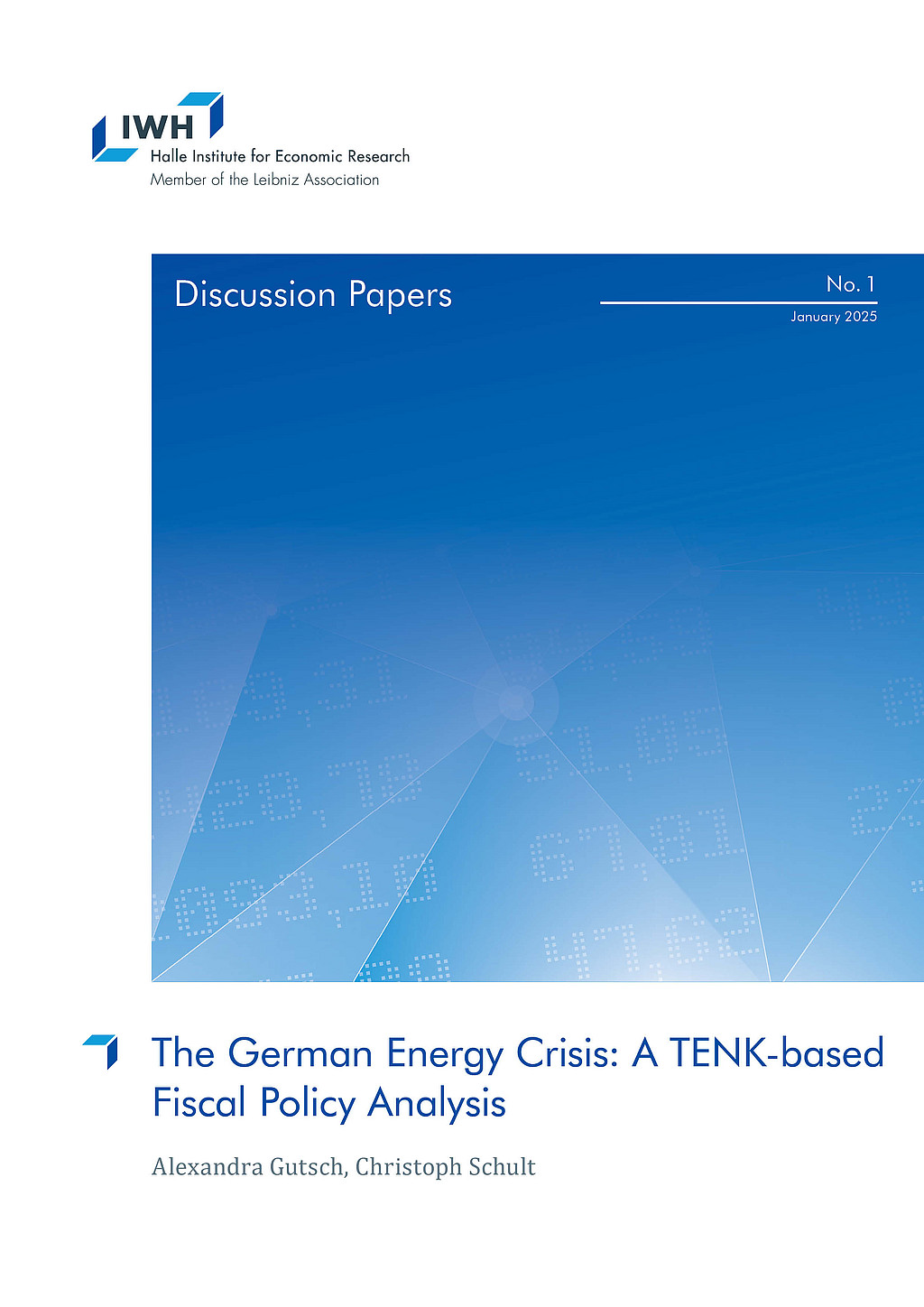
The German Energy Crisis: A TENK-based Fiscal Policy Analysis
in: IWH Discussion Papers, No. 1, 2025
Abstract
<p>We study the aggregate, distributional, and welfare effects of fiscal policy responses to Germany’s energy crisis using a novel Ten-Agents New-Keynesian (TENK) model. The energy crisis, compounded by the COVID-19 pandemic, led to sharp increases in energy prices, inflation, and significant consumption disparities across households. Our model, calibrated to Germany’s income and consumption distribution, evaluates key policy interventions, including untargeted and targeted transfers, a value-added tax cut, energy tax reductions, and an energy cost brake. We find that untargeted transfers had the largest short-term aggregate impact, while targeted transfers were most cost-effective in supporting lower-income households. Other instruments, as the prominent energy cost brake, yielded comparably limited welfare gains. These results highlight the importance of targeted fiscal measures in addressing distributional effects and stabilizing consumption during economic crises.</p>
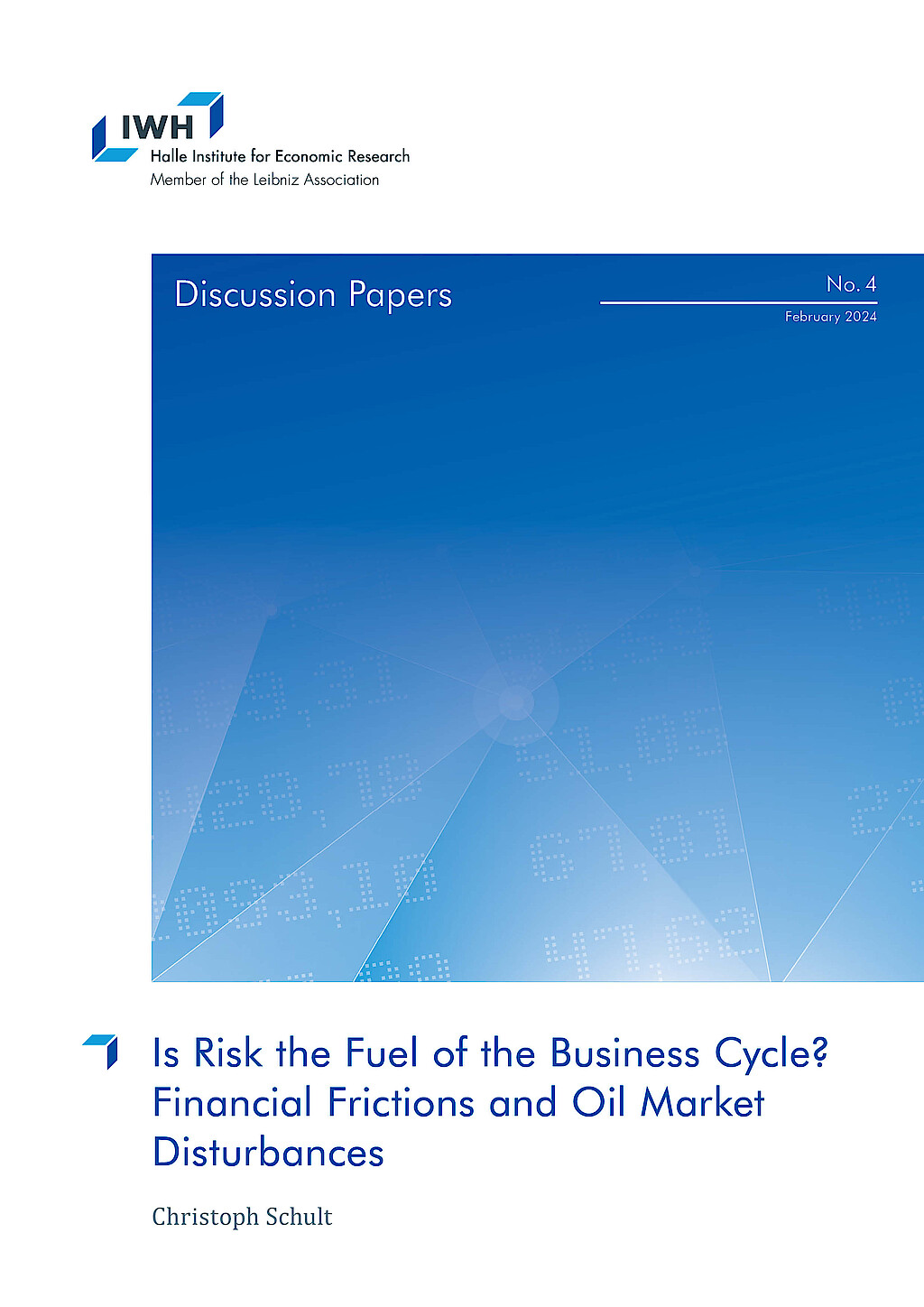
Is Risk the Fuel of the Business Cycle? Financial Frictions and Oil Market Disturbances
in: IWH Discussion Papers, No. 4, 2024
Abstract
I estimate a dynamic stochastic general equilibrium (DSGE) model for the United States that incorporates oil market shocks and risk shocks working through credit market frictions. The findings of this analysis indicate that risk shocks play a crucial role during the Great Recession and the Dot-Com bubble but not during other economic downturns. Credit market frictions do not amplify persistent oil market shocks. This result holds as long as entry and exit rates of entrepreneurs are independent of the business cycle.
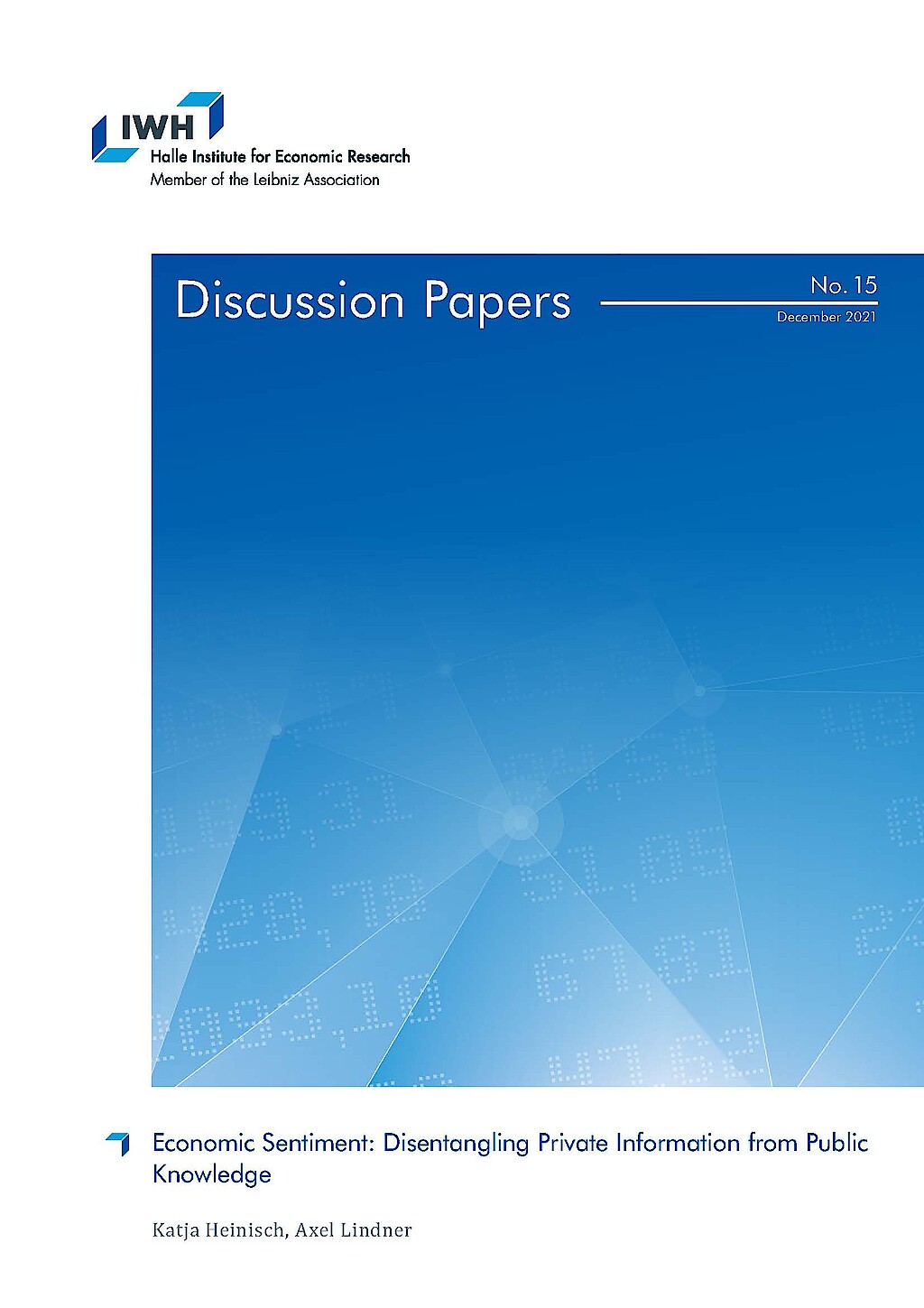
Economic Sentiment: Disentangling Private Information from Public Knowledge
in: IWH Discussion Papers, No. 15, 2021
Abstract
This paper addresses a general problem with the use of surveys as source of information about the state of an economy: Answers to surveys are highly dependent on information that is publicly available, while only additional information that is not already publicly known has the potential to improve a professional forecast. We propose a simple procedure to disentangle the private information of agents from knowledge that is already publicly known for surveys that ask for general as well as for private prospects. Our results reveal the potential of our proposed technique for the usage of European Commissions‘ consumer surveys for economic forecasting for Germany.


























